
Click on one of the following LINKS to view the main sections of the Site :-
T H E C O L L E G I A T E F I R E
The object of this page is to try to get some people's recollections of what actually happened. We are not expecting to read "I was sitting at my desk, studying Latin, when I felt a strange heat behind my chair". We'd like to know what people's reactions were, to the news of the fire. Can you remember where you were, when you first heard about the fire? What did people do ? Did you, or your friends, go to see the flames ? Did you go down afterwards to view the damage ? What was printed in the newspapers ? Did you take any pictures ? If you have a story that you feel that people would enjoy, then please feel free to write in.
We'll start off with with some history, by J.Fowler :-
THE FIRE.----- By John Fowler
The "Great Fire" of the Collegiate took place on Monday 17th October, 1994. It was reported that the blaze broke out on the second floor at 4 pm. Ironically this was “going home time”, but the only bell sounding that fateful day was the Fire Bobbies.
Anything to do with fires always remind me of the famous sketch by the great Liverpudlian comedian, Robb Wilton. I am not old enough to remember it the first time around but have seen in many times repeated on TV. It was a good job he was not at the end of the phone when somebody rang the Fire Brigade.
“ Shaw St, now let me think, Shaw St, don’t tell me, I know it, I know it. Oh, I could walk there. We will be there as soon as we can. Can you keep it going till we get there? “
The flames reached 100 feet, and left a pall of smoke over the city centre for hours. Hence the famous saying---”Red sky at night---the Collegiate`s on fire! “
The Grade I I listed building was built in 1840, and was designed by the same man who produced St.George`s Hall, Harvey Elmes, a right smarty pants. Everything went well for 145 years, just a little bit of re-decorating every now and again, as you do, until 1985 when a relatively small fire ( no details ) and an education re-organisation closed the school. The owners of the building, the Liverpool City Council, re-opened it briefly as an annexe of Breckfield Community School, but closed it again in 1987.
That is a brief history of the bricks and mortar, but what went on inside is another story, only known to those who attended and lived to tell the tale. I think it best not to mention the canings, the Prefects` plimsoll, and PT lessons ,and that was just Thursdays.
After the school closed as a venue for learning in 1987, there were many and varied uses proposed, all of which never came to fruition. It was usually reported that a “team of experts” were working on bringing it back to life, but this was all “hot air”, which eventually resulted in a fire.
The definition of a Grade 11 listed building is a building of special interest, which warrants every effort being made to preserve it. As my grandson would say, “yeah right!”. The building had been left to rot, and a survey in the early 90`s showed that the roof leaked, there were large pools of stagnant water on every floor level, dry rot eating away at the third floor, and the sandstone walls were damp. Otherwise it was fine.
There were always reports of vandals and yobs, ( sounded like my class were still there ), and also squatters. I think we called them “Transistus” in my day. Thieves had taken architectural fixtures, ornamental fireplaces, and carved wood panelling, and any valuables they could lay their hands on. My exercise books, long held up as example to all, were missing. I am not sure that big organ looked good in anyone’s front parlour.
What caused the fire was as mysterious as a M.P`s expense account. A Policeman spokesman ( always wheeled out, at times of crisis ) said it could have been started by a stray firework that came through the missing roof. Which begs the question, who stole the roof ? We used to start a fire by putting the Echo over a shovel on the hearth , but this method was never mentioned. Basically the Police, (like when they had their toilets stolen), had “ nothing to go on”.
Nobody admitted setting the school alight, but there were many suspects. I often overheard naughty boys, going home on the 46 bus, threatening to “ burn the bloody place down”, just because they had got detention for not wearing their cap. The fire would have brought them happiness.
It could have been started by a rogue Bunsen burner in the Physics lab., still traumatised by the lessons given by a diminutive ET look-alike. I was once clouted across the face for committing the heinous crime of “fidgeting.” I never did commit another fidget in my life, and luckily it never put me off strong, demonstrative women---my wife told me to put that in. If there had been Injury Lawyers in those days, there would have been no need for me to see the Careers Officer. In fact, there would have been no need for me to have a career.
The fire could not have started from the canteen as the dinners were never that hot , and there were no bike sheds to hide behind for a quick smoke. Anyway, the squatters had given up ciggies for health reasons--they had moved on to cocaine. Fire Brigade investigators said arson had not been ruled out, but I think it never is, when a fire starts in an empty building. At the end of the day no bright spark came up with the cause. (Oh dear!)
After it had all died down, the building was left a charred shell. The Council called a top level ( I think it was on the 4th floor ) meeting, to see if there was any hope of saving the building. Happily, after a detailed examination it was revealed that most of the structure was sound and it did not need demolishing. The top had been destroyed but the ground and lower floors were good. Unfortunately there was no trace of my exercise books.
The Old Boys, in the spirit of “ the show must go on”, held their dinner on the Friday of the week of the fire. Let’s hope there were no burnt offerings. As this simply would have been in bad taste, in more ways than one.
There is a famous saying ( there always is ), that fire can destroy a building but cannot destroy memories. I cannot remember who said it ---I think it was Guy Fawkes.
Now for some of the letters (about the Fire) that we have received :-
Gentlemen
There seems to be an interesting points about the fire dates. I see in Corrin`s 'Short History of the School' (page 165), he writes :-
"On Friday 8th March (1985), fire was discovered in the School Hall, evidently originating under the platform. The fire seems to have raged relatively unchecked, for a time, as flames over 70 feet high were reported. However an army of 70 firemen managed to prevent the fire spreading to the main building. The staff evacuated all the pupils (530) in three minutes. However all three floors of the hall building were destroyed, including the dining hall, assembly hall, the stage or platform, and the three-manual organ"
This seems to establish that the big fire occurred in 1985 and that the School building was actually occupied by pupils at the time. if this is the case, it would be very interesting to hear from some of these (530) Old Boys.
Incidentally, the phrase " ...... originating under the platform. ........", would seem to point toward the Kitchen, as has been suggested before.
I think it would be worthwhile making contact with the Merseyside Fire Service for more details.
Arthur Evans (1941-1946)
Gentlemen
I have been interested to see the exchanges about the fire. At the time, I was working In Metropolitan House in Old Hall Street for the former MCC.
I well remember one Friday evening, being called to the back of the building. I seem to recall watching flames leaping up from the Collegiate building.
I think that we vacated Metropolitan House (as MRB) sometime in 1987. So the first fire must have occurred sometime before 31.03.86.
Bill Baldwin (1948 -53)
The Collegiate Fire
During the academic year 1984-85 I used to look forward to Friday afternoons: my whole afternoon was taken up with a sixth form practical which was a pleasant enough way to end the week.
Compared with the old days school ended early. Under Russell Woodward the long lunch hour had been reduced and we normally finished, I think, at 3:40 pm.
On the day of the fire, at about 3:00 pm, the fire alarm sounded. Sadly, it was not uncommon during our final years for fire alarms to be set off maliciously and I did not hurry to get the sixth form to close down their experiments, that is, until the lab technician came in and confirmed that this alarm was genuine.
We followed the drill and assembled in the yard.
From the south yard we could see smoke issuing from the hall. It found its way through every conceivable crevice including cracks in the brickwork that had hitherto remained invisible.
Soon the fire became more intense. Glass was cracking and we could hear the sound of the roof collapsing although I have no recollection of flames rising “a hundred feet into the sky”. At some stage during this protracted destruction the fire brigade attended and pumped countless gallons of water into the doomed building. We must have lingered in the yard for an hour or two as we said a sad farewell to a building that had been a significant part of so many lives.
The next morning, Saturday, I was taking my son into town for his piano exam and on the way home I called in at the Collegiate; Ellis Clarke and a few other staff members were there. We surveyed the scene from inside the building. The sky was where the skylight used to be, the hall was still dripping from the dousing it had had and there was an all-pervading smell of smoke.
The corridors around the outside of the hall were passable and I made my way to the tiny staff room at the back of the hall where a select group of bridge players used to spend their lunch time. The room had also been used as a green room during school plays and operas. Part of the ceiling had collapsed under the pressure of the firemen’s water and the furniture was in disarray but I cannot recall other damage.
I had my camera with me and I recorded some of the destruction.
The major damage was to stage and the organ. This led to the conclusion that the fire had started under the stage. That low-ceilinged space had been a junk-room filled with scenery and properties from decades of school productions. Perhaps there was an electrical fault or perhaps this storeroom was used as a place where illicit cigarettes could be smoked far from the eyes of the staff. I do not think the cause was ever determined.
For me it was a poignant end to my time at the Collegiate. We knew that the school had been condemned to oblivion by the Education Committee but it was so sad to see this violent end to a part of the building that had provided me with so much enjoyment over the years. In the 1960s I had produced six Gilbert and Sullivan operas on that stage and in the 1970s I had put on three plays. The school hall had a special place in my life.
In those final months of the Collegiate the smell of smoke never left the building although the hall area was securely boarded off and perhaps the end came eventually with a whimper rather than a bang.
Bob “Arty” Brown
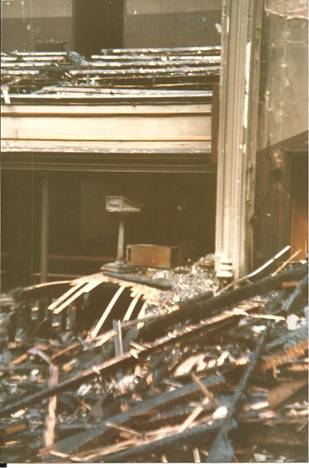
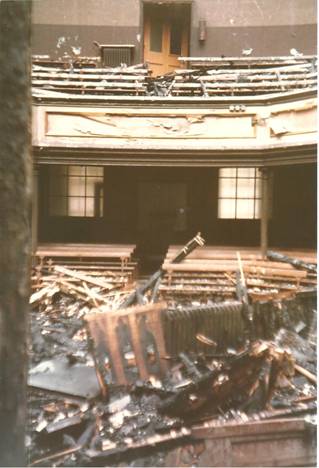
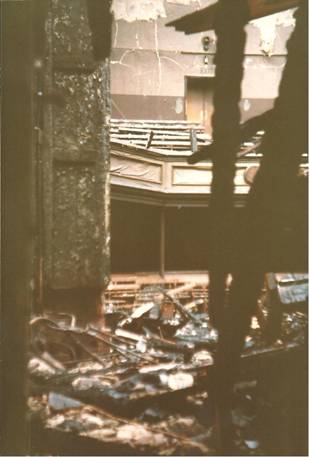
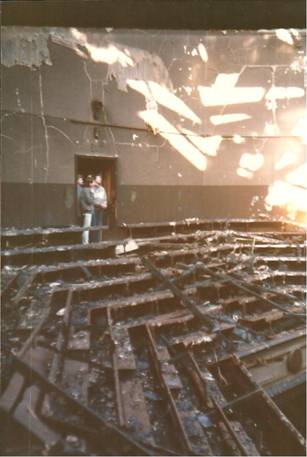
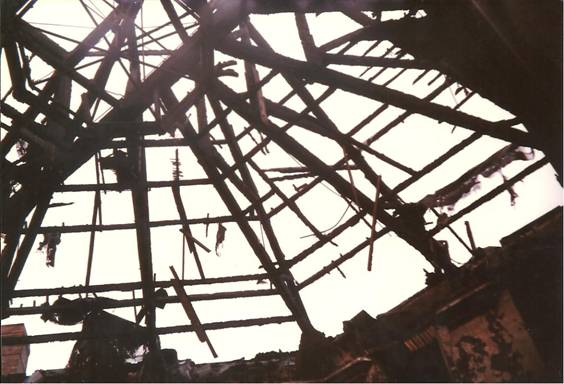
Photographs of the Collegiate hall, the morning after the fire. © RT Brown, 1985
From: David Windrow (1981-1985) 5b1
Sent: Thursday, February 16, 2012 4:51 PM
Subject: Fire 1985
Dear Webmaster,
With respect to the fire, it was started under the old piano which was stored on the lower floor of the assembly hall to the left as you walked in.
I remember that day well. I was in class 5b1, at that time. I had decided to go home early (sag the last lesson). Living in Aintree, at the time, I got off at 3.00 went to get the bus from what was the Ribble bus station in town.
As the bus was going past the old TGWU building, I saw two fire engines flying up Islington and a plume of smoke up the hill. I thought nothing of it.
When I got home, the phone rang. It was my mate from school, "Dave". He told that he had had to 'grass me up, for sagging'.
I asked him why. He told me that it was because the school had gone on fire and Mr Butler was just about to go back in, to find me. So, he had to tell him where I was. Fair enough really, I suppose.
Oh, and I know where the fire started because everybody in our year knew who started it. It was some idiot from 5c2.
Yours - David Windrow 1981-1985
© Liverpool Collegiate Old Boys' Association (2018)